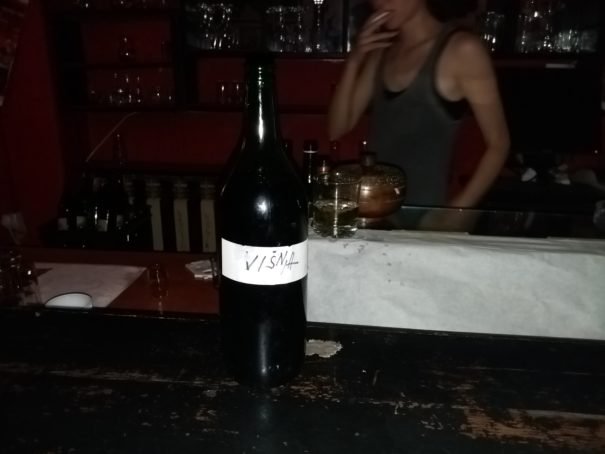
A Solid Sarajevo Bar Option For the Brandy Inclined

A Solid Sarajevo Bar Option For the Brandy Inclined
Rakija in Sarajevo
It’s 10 p.m. on a Monday in Sarajevo. Down a dark, cobbled street at Kino Bosna, things are just gearing up.
It may be Ramadan in this Muslim-majority city—an old crossroads of civilizations that retains a heady mix of European and Ottoman influence—but the rakija is flowing.
The dilapidated bar’s clientele—students, artistic types, and a few aged bohemians—are downing vast quantities of the Balkan brandy in preparation for another night of live Bosnian folk music, all mournful vocals, guitars, and gypsy accordion.
Before the collapse of Yugoslavia, the cinema, built in the 1920s and the first in Sarajevo, showed everything from classics to blue movies. It kept holding screenings even through the war in the 1990s, although when the city was under siege it was regularly hit by shelling.
With a range of cinemas available in the city’s malls post-war, the old building was converted into a bar and music venue. The cavernous hall has been stripped of its cinema seats, but its peeling walls still have black and white pictures of silver screen stars such as Marilyn Monroe and Marlon Brando, and are strung with old reels of film. Most of the décor, though, is hidden behind the swathes of heavy cigarette smoke—in much of the Balkans, people still light up indoors.
As the band makes its way to each table of drinkers, rakija-fuelled excitement builds and patrons get to their feet, clapping along with the music and twirling wildly. Quite a few know the lyrics of the sevdalinkas, or Bosnian folk songs, and join in heartily.
The bar, which must boast one of the grubbiest toilets in Sarajevo, is a no-frills venue with a menu mainly limited to beer and rakija, which—to the untrained palate—is often indistinguishable from methanol.
As I wait at the bar, a man in his 60s—significantly older than the majority of patrons—offers to buy me my tipple of choice. This is communicated mainly through sign language, because he has no English and my Bosnian is limited to greetings and obscenities. I offer a greeting.
Our rakijas arrive and we clink the shot glasses, “Živjeli!” My drink sends a wave of warmth up into my cheeks and down into my chest.
Rakija is made from plums, and many Bosnians take pride in distilling their own, believing it can treat ailments from poor digestion to flu. Quite a few people here even start the day with a shot of it along with their espresso.
Rakija comes in many flavors, like pine, elderflower, pomegranate, honey and herb, but my favorite is the visnje—sour cherry. This ruby-colored version is more sippable than other variations, and sweeter, but, judging from my headache the morning after, just as potent.